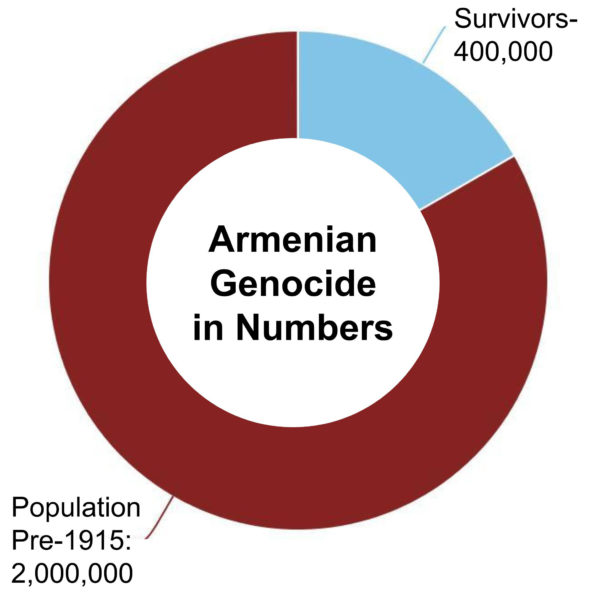I, the daughter of two Armenian refugees, remember the Armenian extermination despite not living through it. I remember it through the pain in my great grandmother’s eyes when she spoke hauntingly of the horrors that faced our family. I remember it every year on April 24, when Armenians walk through the streets to demand recognition for their ancestors who walked to Syria like cattle.
1915, in the midst of World War I, marked the beginning of the Armenian genocide: the systematic removal of Armenians from their historic homeland. On April 24, the Turkish government launched their genocidal campaign by rounding up hundreds of Armenian intellectuals and executing them, and the senseless slaughter only progressed from there. According to the New York Times, before the genocide occurred, an estimated 2 million Armenians lived in that Ottoman Empire. After, only 400,000 remained. The International Association of Genocide Scholars reports that the death toll was over 1 million — half of the previous population. Why did Ottomans do it?

Turkish Sultan Abdul Hamid II said to a reporter in 1890, “I will soon settle those Armenians … I will give them a box on the ear which will make them … relinquish their revolutionary ambitions.”
The revolutionary ambitions he spoke of refer to the Armenian pursuit of basic civil rights which were denied to Christians in the Empire. As the oldest adopters of Christianity, Armenians were especially subject to targeted resentment which blossomed into genocide.
After 104 years of protest, Armenians all over the diaspora were overjoyed when they heard that on Oct. 29, 2019, the House of Representatives passed a bipartisan resolution to recognize the Armenian genocide. While only one state, Mississippi, does not recognize the genocide, getting the resolution to pass on the federal level was a major accomplishment. Some representatives, like Congresswoman Ilhan Omar, opposed the bill for its bad timing. Why only now, when relations with Turkey are strained, has this resolution even made it to the floor? While I understand this perspective, the political driving forces behind this bill do not undermine its impact on the Armenian community. Rep. Omar also criticized the lack of inclusivity of the resolution because she believes it should acknowledge all genocides. All atrocities should be recognized, but by lumping the recognition of multiple tragedies into one, we devalue each tragedy’s individual weight. A handful of people, including the Turkish government, invalidly contested the resolution for calling the events in 1915 a genocide as opposed to a mass killing. What Ottomans did was not a mass killing because it was systematic; the confiscation of Armenian property, concentration camps, and forced death walks were all too real for many Armenians in the Empire at the time.
Time and time again, the recognition of their suffering has been cast aside and rendered worthless.
Regardless of the opposition to the resolution, it seemed like a step in the right direction. The Armenian people’s hopes for healing came to a crashing halt when Senator Lindsay Graham decided to block the House’s ruling from passing in the Senate, conveniently after a meeting with Turkish President Erdogan. During a press conference, Erdogan claimed that Turkey was hurt deeply by the United States’ decision to recognize the genocide. Unfortunately, unlike Turkey, Armenia is not a significant global figure. They rely on powerhouses like the United States to defend their right to the acknowledgment of their pain. It is shameful of America to claim moral authority while placing political interests over her supposed values of justice and liberty. Nobody denies that slavery or the Holocaust existed — many resolutions have been passed to recognize them. So why do Armenians have to constantly justify their suffering? Does the smaller scale of this atrocity render it less tragic or not tragic at all? The wounds of the genocide puncture so deeply into the fabric of their culture because not only has their pain been cast aside, but also the admission that their pain is valid as well.
It is easy to distance oneself from the suffering of a group so minuscule. However, the consequences of inaction have been grave. We see history repeating itself right now, as the Turks continue to subjugate Kurds in Syria. Recognition is not only about healing, but it is also a means to hold groups accountable for their actions.
I am astounded by the resilience of the Armenian people. Time and time again, the recognition of their suffering has been cast aside and rendered worthless. They will never stop marching for recognition, they will never allow their voices to be silenced, and they will fight until they are allowed their right to heal. The House resolution was only the beginning.



